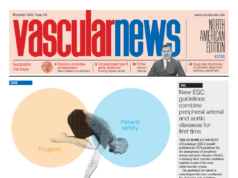 The Minneapolis Heart Institute Foundation (MHIF; Minneapolis, USA) has announced the publication of research showing improved patient outcomes and significantly decreased 30-day mortality in aortic dissection patients managed through a unique comprehensive care strategy designed by a team with multidisciplinary expertise.
The Minneapolis Heart Institute Foundation (MHIF; Minneapolis, USA) has announced the publication of research showing improved patient outcomes and significantly decreased 30-day mortality in aortic dissection patients managed through a unique comprehensive care strategy designed by a team with multidisciplinary expertise.
The manuscript, “Impact of a multidisciplinary acute aortic dissection program: Improved outcomes with a comprehensive initial surgical repair strategy,” was published in the Journal of Vascular Surgery.
“Several years ago, we formed a multidisciplinary acute aortic programme that showed we could impact the time to diagnose and treat this lethal condition,” said Kevin Harris, cardiologist and researcher, MHIF. “This new published analysis looks at the outcomes when the strategy changed a couple of years ago where the vascular surgeons routinely joined the cardiovascular surgeons in the initial evaluation, and often treatment, of the patients with type A dissection involving the aorta closest to the heart. Due to the efforts of our talented cardiovascular and vascular surgeons, we have seen more patients get lifesaving surgery, the surgery is more comprehensive, and surgical mortality has dramatically decreased.”
This research shows that involving both vascular and cardiac surgeons in the initial evaluation led to treatment plans that included more complex surgical procedures, addressing more than just the initial repair of the acute aortic dissection. For patients, the results show that while they face recovery from a more comprehensive initial surgical repair, there is significant improvement in long-term outcomes, including survival.
Acute aortic dissection is associated with high mortality (1–2% mortality every hour in the first 24–48 hours), an press release from the MHIF states. The primary goal of care for these patients in the acute setting is survival—preventing death—and it requires quick diagnosis and surgical treatment. The goal of this research is to integrate care between specialties to expedite the diagnosis and transfer, standardise pharmacotherapy and pre- and intraoperative imaging protocols, expedite operating room mobilisation and determine the optimal surgical approach for these patients.













